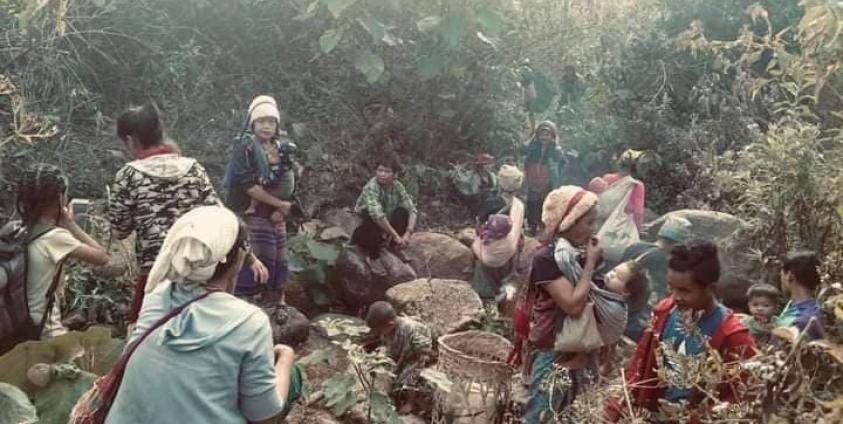As Burma’s NLD led government talks up its peace plans with ethnic armed groups, its military started the new year by shelling Karen villages forcing 4,000 civilians into hiding.
Community based groups have said the recent levels of military aggression, by the Burma Army against Karen people, is the worse since a ceasefire was agreed with the Karen National Union in 2012.
Displaced people from villages within the Kyauk Gyi township track are desperate for help – without basic shelter, medical supplies, food and clean water. Karen community based organizations trying to get aid through to the desperate villagers have been blocked.
An alliance of European Karen community groups issued a statement explaining that blocking humanitarian assistance to displaced people “is also an international crime.”
The alliance, the European Karen Network, said in its a statement that, “4,000 people are now hiding in the jungle without food and shelter as a direct result of mortar shelling and increased militarization by the Burma Army.”
The European Karen Network demanded European donors to Burma’s peace process speak out against the Burma Army’s continued attacks on ethnic people.
The European Karen Network said despite the EU and other European nations “being the main donors to the Joint Peace Fund, which is supposed to support the peace process in Burma” they have been silent.
The European Karen Network urged the “European Union, United Kingdom, Norway, Finland, Italy, Switzerland, and Germany, as donors to the Joint Peace Fund, to demand an immediate end to the indiscriminate targeting by the Burma Army of civilians in Karen state.”
The European Karen Network pointed out that the Burma Army began in “early December 2020 … deliberately firing artillery shells into civilian areas, breaking the Nationwide Ceasefire Agreement (NCA).”
The European Karen Network said villages in “Mutraw (Papun) and Kler Lwe Htoo (Nyaunglebin) districts of northern Karen State. One civilian has been killed and two injured, including a child. These attacks are war crimes.”
Karen villagers told Karen News recent increase in Burma Army attacks are the worse since the ceasefire was agreed to in 2012. Villagers said the initial ceasefire brought some stability to their lives, but the recent attacks and displacement into jungle hideouts have once more made their lives insecure. “We can’t tend to our crops, our children can’t go to school and it’s unsafe to even stay in your own home.”
The European Karen Network said the “increased militarization by the Burma Army and hundreds of incidents of the Burma Army breaking the terms of the NCA (National Ceasefire Agreement)” is a clear indication the “current peace process is deeply flawed and is not bringing peace or bringing us closer to a genuine political settlement that will help bring lasting peace. The current International support for the peace process is in danger of delaying progress in creating a workable process to bring real peace to our country.”
We support the call of the Karen Peace Support Network, representing a broad range of Karen civil society, in their call for the Burma Army to withdraw from contested areas in Karen State.
The Karen Peace Support Network statement demanded the Joint Peace Fund stop its “support to the peace process until the Burma Army withdraws from contested areas in ethnic states nationwide, and until the government and military allow unrestricted humanitarian assistance to people displaced by conflict and militarization of ethnic lands by the Burma Army. We call upon the European Union and other European countries to work with other Joint Peace Fund donors to ensure that these steps are preconditions to further support the peace process.”
Radio Free Asia reported that more than “170 social and civil society groups on Jan. 20 sent letters to Myanmar’s President Win Myint and the country’s state counselor and de facto national leader Aung San Suu Kyi appealing for help to end the armed conflict in Kayin [Karen] State.”







